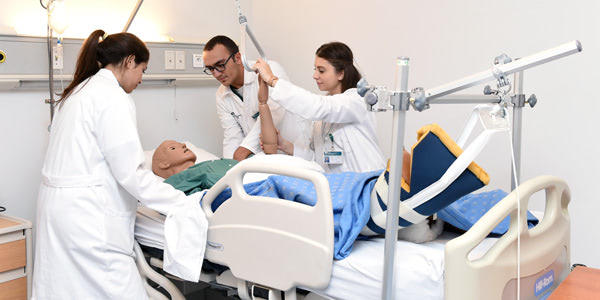Why Study Nursing at LAU?
The B.S.N. program at the Lebanese American University offers many innovative features that distinguish it from other nursing programs and that will prepare nursing graduates to work in today’s fast-paced health care settings and will lay the foundation for graduate study in nursing or related fields such as public health.
Strong Liberal Arts and Sciences Curriculum (LASC)
The nursing curriculum incorporates LAU’s Liberal Arts and Sciences core requirements. This gives students the tools of independent learning and adds breadth and depth to the curriculum. Many of the LASC requirements also provide the knowledge and values required to be a sensitive and ethical health care professional.
Campus locations
During the fall semester of the sophomore year, nursing students can choose to enroll on either of LAU’s campuses - Beirut or Byblos. For the spring semester of the sophomore year and during the junior and senior years, nursing students must be enrolled on the Byblos campus, where the School of Nursing offices, classrooms and laboratories are located. Bus transportation is available through the university for students wishing to use it. Dormitories are available on both campuses.
State-of-the-art classrooms and laboratories
The School of Nursing facilities include “smart” classrooms equipped with the most current instructional technology as well as a Clinical Simulation Center configured in a hospital-like setting that will foster active learning and engagement with peers. The Simulation Center is equipped with advanced patient simulators that allow students to learn new skills in a safe setting, practicing them until they gain confidence.
Concept-based learning
The ARCSON faculty has developed a concept-based curriculum that will foster in-depth understanding of the knowledge essential for today’s professional nurse. Concept-based learning moves beyond memorization of facts and uses instructional approaches that assist students to integrate new knowledge and apply it to patient care. The health and illness concepts being taught form the foundation for nursing practice with patients in all types of settings. The professional nursing concepts included in the curriculum pertain to the values, roles and responsibilities of professional nurses and key aspects of the health care system. You will learn these concepts and their application through instruction in the classroom, Clinical Simulation Center, and hospital and community health settings.
Clinical learning experiences
“Practicum” and “clinical” courses refer to the learning experiences for nursing students that occur in hospitals and other health care agencies. The main clinical sites for ARCSON are the Lebanese American University Medical Center - Rizk Hospital in Beirut and the Lebanese American University Medical Center - St. John’s Hospital in Jounieh. Other hospitals, community health agencies and NGOs in the Byblos and Beirut areas may be used for clinical and observational experiences. Using both hospital and community clinical sites helps ensure that students interact with various patient populations, examine differences and similarities in health care settings, and are exposed to a wide variety of nursing and health care providers. Learn more about our school’s clinical affiliates.
Interprofessional Education (IPE)
Professional registered nurses work as members of interdisciplinary health care teams. Yet, most nursing programs do not provide learning experiences related to interdisciplinary teamwork. At LAU, nursing students will study with students enrolled in medicine, nutrition and pharmacy in classroom, laboratory and clinical settings. Students who graduate from LAU’s B.S.N. program will feel confident functioning as an equal partner of the health care team and be ready to collaboratively plan, deliver and evaluate patient care. Browse the IPE website for more information.
Summer Nursing Internship Experiences
Internship education is practice-based learning in which students alternate periods of classroom study with planned, career-related work experiences. During internship experiences, students are supervised and evaluated by the employer. The nursing curriculum at LAU includes two required Internship learning experiences: NUR211 Summer Nursing Internship I, and NUR311 Summer Nursing Internship II. Through these experiences, students will grow professionally and personally in all three domains of learning: cognitive, affective, and psychomotor. Students’ overall performance is overseen by LAU faculty. Read more about the Summer Nursing Internship Experiences at our school.
Blended and web-enhanced courses
The School of Nursing faculty uses the Blackboard™ learning system as an adjunct to courses. Materials including course syllabi, class announcements, handouts, and other resources are made available to students on Blackboard. Faculty and students can also use Blackboard to more easily communicate with each other. Some of the nursing courses offered in summer terms are “blended” or “web-enhanced” courses. This means that some of the content will be offered in the traditional classroom setting and the remaining will be offered over the internet.
Nursing Scholarships
A special LAU scholarship fund has been created for the nursing program. All students who complete an LAU financial aid application will receive a Nursing Program Grant. The amount of the scholarship will vary depending on the other scholarship and financial assistance that you qualify for. The total amount of your Nursing Program Grant plus other scholarships and financial aid may cover as much as 100% of your tuition. The Nursing Program Grant apply for all three years of the B.S.N. program. Learn more about financial aid options at our school.
